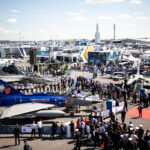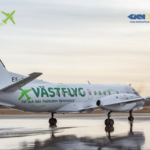National flag carrier Vietnam Airlines has completed SkyTeam’s ‘Sustainable Flight Challenge’, designed to encourage global airlines to find innovative ways to make air travel greener, on long-haul flight VN37 from Hanoi to Frankfurt, Germany.
In partnership with local Vietnamese social enterprise Limloop, Vietnam Airlines recycled hundreds of unusable life vests that no longer met safety requirements into handbags for passengers. The airline also served a sustainable inflight meal using seasonal ingredients as well as a plant-based alternative protein sourced from sustainably grown soybeans, in partnership with the US Soybean Export Council (USSEC). These initiatives enabled the airline to reduce emissions and in-flight waste, making the flight more eco-friendly.
Reducing environmental impact
The airline is also working with VietHarvest to supply excess food from its kitchens to ensure this quality food is provided to people in need, rather than going to waste.
Dang Anh Tuan, head of corporate communications at Vietnam Airlines, commented on the initiative: “Enhancing our sustainability efforts by introducing new solutions that reduce environmental impact is one of many meaningful activities that we are working on, and we believe this can make a positive impact on our society and inspire airlines worldwide to change. Vietnam Airlines is determined to reinforce our commitment to environmental goals, including net zero emissions by 2050.”
About The Sustainable Flight Challenge
The Sustainable Flight Challenge (TSFC) was launched in May 2022 and brought 16 airlines together to search for the most innovative solutions to make flights as environmentally sustainable as possible. It is the aviation industry’s first sustainability initiative of its kind and aims to effect meaningful change in the short-term. All participating airlines commit to sharing their innovations and insights industry-wide after the challenge to help reduce aviation’s environmental impact while the industry waits for greater availability of alternative fuel sources.
This year’s challenge took place from 15 – 28 May, with 22 airlines participating. In total, 72 flights were planned, split into 24 short-haul flights, 24 medium-haul flights, and 24 long-haul flights.

